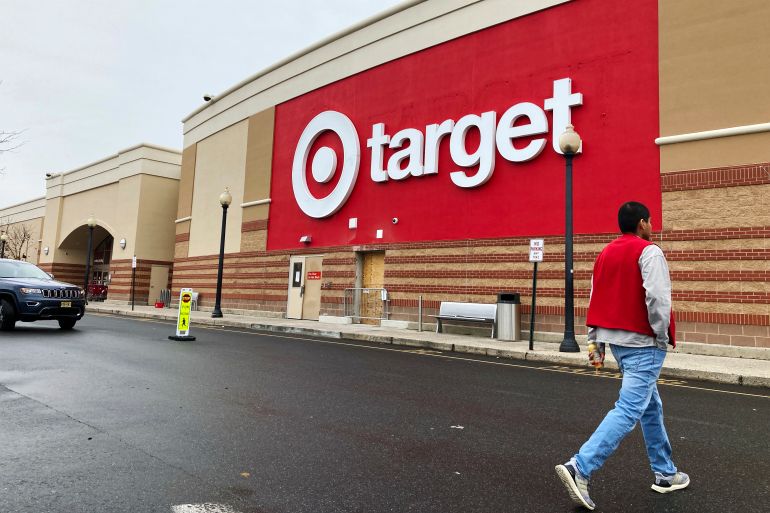Target cuts annual forecast as tariffs, boycotts weigh on sales
Unlike Walmart, Target is more heavily reliant on China for goods. Shifts in its DEI policy have spurred boycotts, which also have caused a sales slump.

Published On 21 May 202521 May 2025
Target has slashed its annual forecasts amid a pullback in discretionary spending due to tariff-driven uncertainty and a backlash against shifts in its diversity, equity and inclusion (DEI) policy.
The United States big box retailer, which reported its first-quarter earnings on Wednesday, relies on China for 30 percent of its store label goods. While it is on track to reduce its dependency by another 5 percent by the end of the year, tariff-driven uncertainty has caused a slump.
Recommended Stories
list of 4 itemsend of list
In its forecast, the Minneapolis, Minnesota-based retailer expects a low single-digit decline in annual sales. Wall Street analysts expected a marginal increase of 0.27 percent in annual sales, according to the LSEG. Target previously forecasted net sales growth of about 1 percent.
This comes as Bank of America recently forecasted that consumers have eased up on spending as the most recent report from The Conference Board showed a slowdown in consumer confidence, which hit a 13-year low in April. The US economy also showed the first contraction in three years in the first quarter.
Advertisement
Target’s first-quarter comparable sales fell 3.8 percent compared with analysts’ estimates of a 1.08 percent decline. It expects annual adjusted earnings of $7 to $9 per share, compared with its prior forecast of $8.80 to $9.80. Analysts were expecting $8.40.
“Expectations were very low for Target’s first quarter. Even against that, Target’s results came in light,” Michael Baker, a DA Davidson analyst, told the news agency Reuters. Target’s stock has performed poorly, down nearly 28 percent this year, in contrast to Walmart’s 9 percent gain and Home Depot’s 2.3 percent decline.
Target’s stock is tumbling on the news of its disappointing earnings report. As of 11am in New York (15:00 GMT), it was down 2.91 percent from the market open although it is up more than 1 percent over the past five days.
DEI boycotts weigh on sales
Target also said its first-quarter performance was impacted by changes made to its DEI policies in January.
Target ended many of its DEI policies, drawing condemnation as some of its critics noted that its commitment to inclusiveness had helped attract younger, more diverse consumers. The decision generated more attention as it coincided with US President Donald Trump’s executive order to eliminate DEI policies in federal agencies and schools.
The backlash led to economic boycotts, notably from Reverend Jamal-Harrison Bryant, a Georgia pastor who organised a 40-day “fast” of Target stores. He has since called for those efforts to continue in recognition of the fifth anniversary of George Floyd’s murder by police in Minneapolis, Target’s headquarters.
Advertisement
CEO Brian Cornell said the reversal of some DEI policies played a role in first-quarter performance but he couldn’t quantify the impact.
Worse than competitors
“Target’s [results] do nothing to restore confidence in the company. On the contrary, they are emblematic of a business that has made too many mistakes and has lost its way on several fronts,” GlobalData Managing Director Neil Saunders told Reuters, pointing to issues including poor inventory management and a lack of exciting merchandise.
Target’s forecast contrasts with its bigger rival Walmart, which maintained its annual forecasts last week but said it would need to pass on higher prices due to tariffs. That has drawn the ire of Trump, who said Walmart should “eat the tariffs” on imported goods instead of passing on the costs.
Unlike Walmart, which generates the bulk of its revenues by selling groceries like bananas, milk, toilet paper and shampoo, a majority of what Target sells falls in the nonessential category – largely apparel, home furnishings and beauty products, which it sources from China.
TJX, the parent company of retailer TJ Maxx, also reported its earnings on Wednesday, and while tariffs loom, the company is set to maintain its forecasts. The Massachusetts-based big box retailer expects comparable sales to grow 2 percent to 3 percent during the current quarter.
Unlike Target and Walmart, TJ Maxx, relies on expansive sourcing from middlemen in the US, which limits the impact of any new tariffs on China.
Looming price hike
On a media call, Target executives declined to provide details on potential price increases due to tariffs. Most tariff-related increases could be offset, they said, but acknowledged that raising prices could be a “last resort”.
Advertisement
Cornell said pricing decisions will largely depend on ongoing efforts to source more products from the US and reduce reliance on China.
“That is going to play a very important role,” he said.
Rick Gomez, the company’s chief commercial officer, said Target is working on negotiating with suppliers, expanding sourcing to other Asian countries beyond China, re-evaluating its product assortment, and adjusting the timing and quantity of orders.
“These efforts are expected to offset the vast majority of the incremental tariff exposure,” Gomez said.
